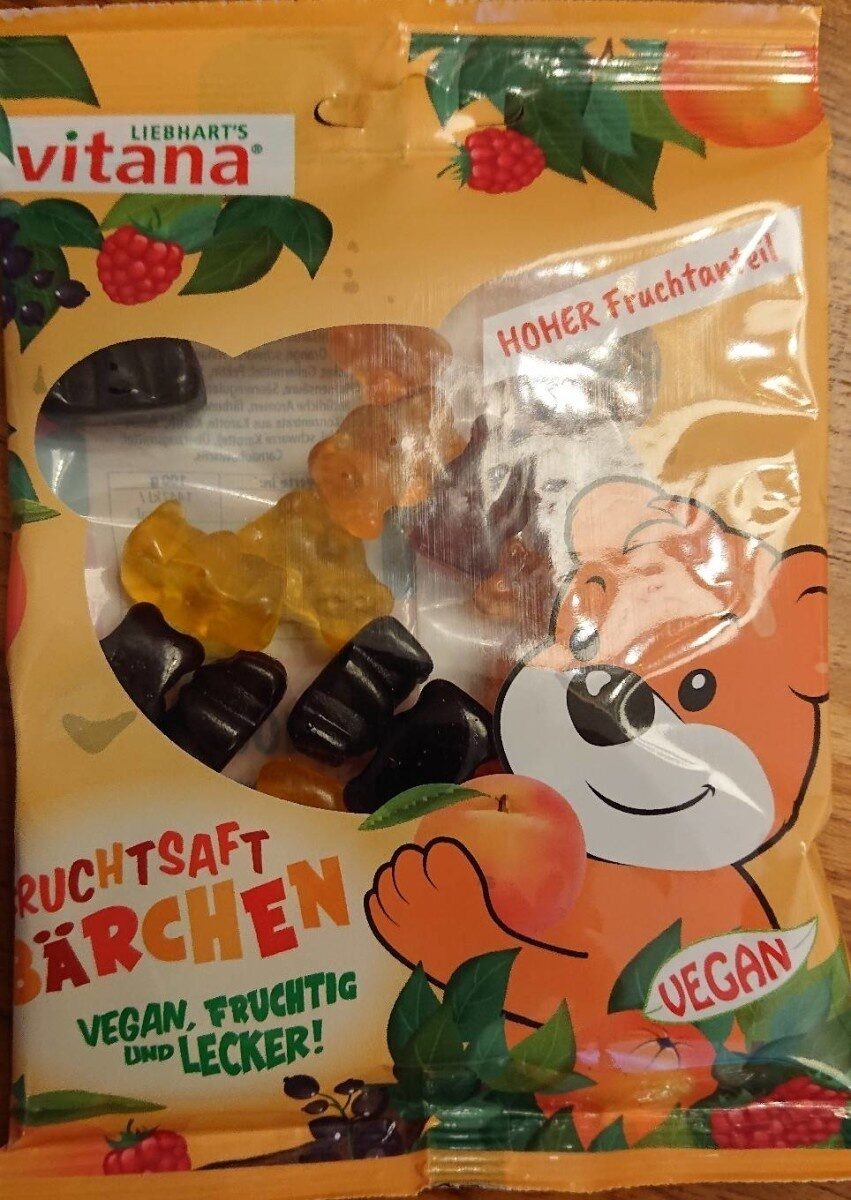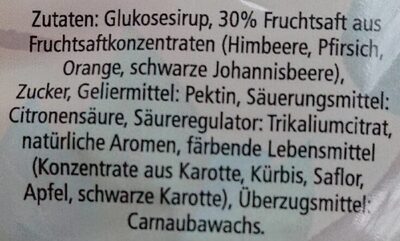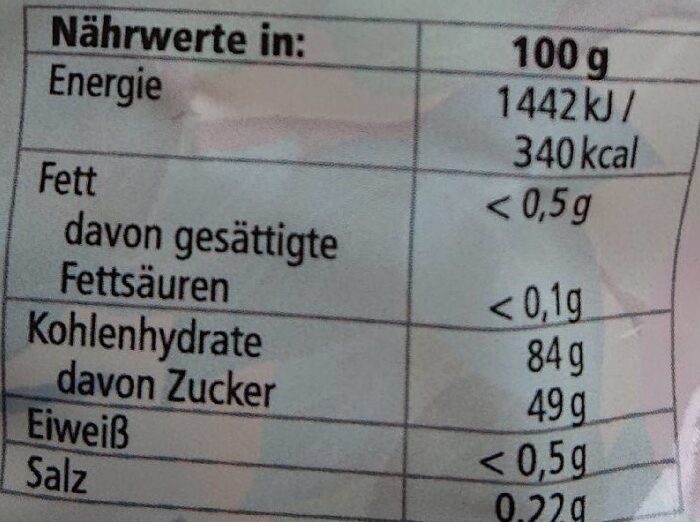Help us make food transparency the norm!
As a non-profit organization, we depend on your donations to continue informing consumers around the world about what they eat.
The food revolution starts with you!
Fruchtsaft Bärchen Vegan - Vitana
Fruchtsaft Bärchen Vegan - Vitana
This product page is not complete. You can help to complete it by editing it and adding more data from the photos we have, or by taking more photos using the app for Android or iPhone/iPad. Thank you!
×
Barcode: 4085900019617 (EAN / EAN-13)
Brands: Vitana
Categories: Snacks, Sweet snacks, Confectioneries, Candies, Gummi candies, Gummy bears
Labels, certifications, awards: Vegetarian, Vegan
Countries where sold: Germany
Matching with your preferences
Health
Ingredients
-
22 ingredients
: Glukosesirup, 30% Fruchtsaft aus Fruchtsaftkonzentraten (Himbeere, Pfirsich, Orange, schwarze Johannisbeere), Zucker, Geliermittel: Pektin, Säuerungsmittel: Citronensäure, Säureregulator: Trikaliumcitrat, natürliche Aromen, färbende Lebensmittel (Konzentrate aus Karotte, Kürbis, Saflor, Apfel, schwarze Karotte), Überzugsmittel: Carnaubawachs.Allergens: Orange
Food processing
-
Ultra processed foods
Elements that indicate the product is in the 4 - Ultra processed food and drink products group:
- Additive: E440 - Pectins
- Additive: E903 - Carnauba wax
- Ingredient: Colour
- Ingredient: Flavouring
- Ingredient: Gelling agent
- Ingredient: Glazing agent
- Ingredient: Glucose
- Ingredient: Glucose syrup
- Ingredient: Fruit juice concentrate
Food products are classified into 4 groups according to their degree of processing:
- Unprocessed or minimally processed foods
- Processed culinary ingredients
- Processed foods
- Ultra processed foods
The determination of the group is based on the category of the product and on the ingredients it contains.
Additives
-
E330 - Citric acid
Citric acid is a natural organic acid found in citrus fruits such as lemons, oranges, and limes.
It is widely used in the food industry as a flavor enhancer, acidulant, and preservative due to its tart and refreshing taste.
Citric acid is safe for consumption when used in moderation and is considered a generally recognized as safe (GRAS) food additive by regulatory agencies worldwide.
-
E332 - Potassium citrates
Potassium citrate: Potassium citrate -also known as tripotassium citrate- is a potassium salt of citric acid with the molecular formula K3C6H5O7. It is a white, hygroscopic crystalline powder. It is odorless with a saline taste. It contains 38.28% potassium by mass. In the monohydrate form it is highly hygroscopic and deliquescent. As a food additive, potassium citrate is used to regulate acidity and is known as E number E332. Medicinally, it may be used to control kidney stones derived from either uric acid or cystine.Source: Wikipedia
-
E332ii - Tripotassium citrate
Potassium citrate: Potassium citrate -also known as tripotassium citrate- is a potassium salt of citric acid with the molecular formula K3C6H5O7. It is a white, hygroscopic crystalline powder. It is odorless with a saline taste. It contains 38.28% potassium by mass. In the monohydrate form it is highly hygroscopic and deliquescent. As a food additive, potassium citrate is used to regulate acidity and is known as E number E332. Medicinally, it may be used to control kidney stones derived from either uric acid or cystine.Source: Wikipedia
-
E440 - Pectins
Pectins (E440) are natural carbohydrates, predominantly found in fruits, that act as gelling agents in the food industry, creating the desirable jelly-like texture in jams, jellies, and marmalades.
Pectins stabilize and thicken various food products, such as desserts, confectioneries, and beverages, ensuring a uniform consistency and quality.
Recognized as safe by various health authorities, pectins have been widely used without notable adverse effects when consumed in typical dietary amounts.
-
E903 - Carnauba wax
Carnauba wax: Carnauba -; Portuguese: carnaúba [kaʁnɐˈubɐ]-, also called Brazil wax and palm wax, is a wax of the leaves of the palm Copernicia prunifera -Synonym: Copernicia cerifera-, a plant native to and grown only in the northeastern Brazilian states of Piauí, Ceará, Maranhão, Bahia, and Rio Grande do Norte. It is known as "queen of waxes" and in its pure state, usually comes in the form of hard yellow-brown flakes. It is obtained from the leaves of the carnauba palm by collecting and drying them, beating them to loosen the wax, then refining and bleaching the wax.Source: Wikipedia
Ingredients analysis
-
Palm oil free
No ingredients containing palm oil detected
-
Vegan
No non-vegan ingredients
Unrecognized ingredients: Fruit juice from concentrate
-
Vegetarian
No non-vegetarian ingredients detected
Unrecognized ingredients: Fruit juice from concentrate
-
Details of the analysis of the ingredients
: Glukosesirup, Fruchtsaft aus Fruchtsaftkonzentraten 30% (Himbeere, Pfirsich, Orange, schwarze Johannisbeere), Zucker, Geliermittel (Pektin), Säuerungsmittel (Citronensäure), Säureregulator (Trikaliumcitrat), natürliche Aromen, färbende Lebensmittel (aus Karotte, Kürbis, Saflor, Apfel, schwarze Karotte), Überzugsmittel (Carnaubawachs)- Glukosesirup -> en:glucose-syrup - vegan: yes - vegetarian: yes - ciqual_proxy_food_code: 31016 - percent_min: 30 - percent_max: 70
- Fruchtsaft aus Fruchtsaftkonzentraten -> en:fruit-juice-from-concentrate - percent_min: 30 - percent: 30 - percent_max: 30
- Himbeere -> en:raspberry - vegan: yes - vegetarian: yes - ciqual_food_code: 13015 - percent_min: 7.5 - percent_max: 30
- Pfirsich -> en:peach - vegan: yes - vegetarian: yes - percent_min: 0 - percent_max: 15
- Orange -> en:orange - vegan: yes - vegetarian: yes - ciqual_proxy_food_code: 13034 - percent_min: 0 - percent_max: 10
- schwarze Johannisbeere -> en:blackcurrant - vegan: yes - vegetarian: yes - ciqual_food_code: 13007 - percent_min: 0 - percent_max: 7.5
- Zucker -> en:sugar - vegan: yes - vegetarian: yes - ciqual_proxy_food_code: 31016 - percent_min: 0 - percent_max: 30
- Geliermittel -> en:gelling-agent - percent_min: 0 - percent_max: 20
- Pektin -> en:e440a - vegan: yes - vegetarian: yes - percent_min: 0 - percent_max: 20
- Säuerungsmittel -> en:acid - percent_min: 0 - percent_max: 13.3333333333333
- Citronensäure -> en:e330 - vegan: yes - vegetarian: yes - percent_min: 0 - percent_max: 13.3333333333333
- Säureregulator -> en:acidity-regulator - percent_min: 0 - percent_max: 10
- Trikaliumcitrat -> en:e332ii - vegan: yes - vegetarian: yes - percent_min: 0 - percent_max: 10
- natürliche Aromen -> en:natural-flavouring - vegan: maybe - vegetarian: maybe - percent_min: 0 - percent_max: 5
- färbende Lebensmittel -> fr:denree-alimentaire-colorante - percent_min: 0 - percent_max: 5
- aus Karotte -> en:carrot - vegan: yes - vegetarian: yes - ciqual_food_code: 20009 - percent_min: 0 - percent_max: 5
- Kürbis -> en:pumpkin - vegan: yes - vegetarian: yes - ciqual_food_code: 20139 - percent_min: 0 - percent_max: 2.5
- Saflor -> en:safflower - vegan: yes - vegetarian: yes - percent_min: 0 - percent_max: 1.66666666666667
- Apfel -> en:apple - vegan: yes - vegetarian: yes - ciqual_food_code: 13050 - percent_min: 0 - percent_max: 1.25
- schwarze Karotte -> en:black-carrot - vegan: yes - vegetarian: yes - ciqual_food_code: 20009 - percent_min: 0 - percent_max: 1
- Überzugsmittel -> en:glazing-agent - percent_min: 0 - percent_max: 5
- Carnaubawachs -> en:e903 - vegan: yes - vegetarian: yes - percent_min: 0 - percent_max: 5
Nutrition
-
Poor nutritional quality
⚠ ️Warning: the amount of fiber is not specified, their possible positive contribution to the grade could not be taken into account.⚠ ️Warning: the amount of fruits, vegetables and nuts is not specified on the label, it was estimated from the list of ingredients: 30This product is not considered a beverage for the calculation of the Nutri-Score.
Positive points: 0
- Proteins: 0 / 5 (value: 0.5, rounded value: 0.5)
- Fiber: 0 / 5 (value: 0, rounded value: 0)
- Fruits, vegetables, nuts, and colza/walnut/olive oils: 0 / 5 (value: 30.2734375, rounded value: 30.3)
Negative points: 14
- Energy: 4 / 10 (value: 1442, rounded value: 1442)
- Sugars: 10 / 10 (value: 49, rounded value: 49)
- Saturated fat: 0 / 10 (value: 0.1, rounded value: 0.1)
- Sodium: 0 / 10 (value: 88, rounded value: 88)
The points for proteins are not counted because the negative points are greater or equal to 11.
Nutritional score: (14 - 0)
Nutri-Score:
-
Nutrient levels
-
Fat in low quantity (0.5%)
What you need to know- A high consumption of fat, especially saturated fats, can raise cholesterol, which increases the risk of heart diseases.
Recommendation: Limit the consumption of fat and saturated fat- Choose products with lower fat and saturated fat content.
-
Saturated fat in low quantity (0.1%)
What you need to know- A high consumption of fat, especially saturated fats, can raise cholesterol, which increases the risk of heart diseases.
Recommendation: Limit the consumption of fat and saturated fat- Choose products with lower fat and saturated fat content.
-
Sugars in high quantity (49%)
What you need to know- A high consumption of sugar can cause weight gain and tooth decay. It also augments the risk of type 2 diabetes and cardio-vascular diseases.
Recommendation: Limit the consumption of sugar and sugary drinks- Sugary drinks (such as sodas, fruit beverages, and fruit juices and nectars) should be limited as much as possible (no more than 1 glass a day).
- Choose products with lower sugar content and reduce the consumption of products with added sugars.
-
Salt in low quantity (0.22%)
What you need to know- A high consumption of salt (or sodium) can cause raised blood pressure, which can increase the risk of heart disease and stroke.
- Many people who have high blood pressure do not know it, as there are often no symptoms.
- Most people consume too much salt (on average 9 to 12 grams per day), around twice the recommended maximum level of intake.
Recommendation: Limit the consumption of salt and salted food- Reduce the quantity of salt used when cooking, and don't salt again at the table.
- Limit the consumption of salty snacks and choose products with lower salt content.
-
-
Nutrition facts
Nutrition facts As sold
for 100 g / 100 mlCompared to: Gummy bears Energy 1,442 kj
(340 kcal)+5% Fat < 0.5 g +196% Saturated fat < 0.1 g +80% Carbohydrates 84 g +9% Sugars 49 g +1% Fiber ? Proteins < 0.5 g -90% Salt 0.22 g +112% Fruits‚ vegetables‚ nuts and rapeseed‚ walnut and olive oils (estimate from ingredients list analysis) 30.273 %
Environment
-
Eco-Score B - Low environmental impact
⚠ ️Select a country in order to include the full impact of transportation.The Eco-Score is an experimental score that summarizes the environmental impacts of food products.→ The Eco-Score was initially developped for France and it is being extended to other European countries. The Eco-Score formula is subject to change as it is regularly improved to make it more precise and better suited to each country.Life cycle analysis
-
Average impact of products of the same category: A (Score: 89/100)
Category: Jelly candy
Category: Jelly candy
- PEF environmental score: 0.21 (the lower the score, the lower the impact)
- including impact on climate change: 1.57 kg CO2 eq/kg of product
Stage Impact Agriculture
51.7 %Processing
31.1 %Packaging
7.6 %Transportation
7.3 %Distribution
2.3 %Consumption
0.0 %
Bonuses and maluses
-
Missing origins of ingredients information
Malus: -5
⚠ ️ The origins of the ingredients of this product are not indicated.
If they are indicated on the packaging, you can modify the product sheet and add them.
If you are the manufacturer of this product, you can send us the information with our free platform for producers.
-
Missing packaging information for this product
Malus: -15
⚠ ️ The information about the packaging of this product is not filled in.⚠ ️ For a more precise calculation of the Eco-Score, you can modify the product page and add them.
If you are the manufacturer of this product, you can send us the information with our free platform for producers.
Eco-Score for this product
-
Impact for this product: B (Score: 69/100)
Product: Fruchtsaft Bärchen Vegan - Vitana
Life cycle analysis score: 89
Sum of bonuses and maluses: -20
Final score: 69/100
-
Carbon footprint
-
Equal to driving 0.8 km in a petrol car
157 g CO² per 100g of product
The carbon emission figure comes from ADEME's Agribalyse database, for the category: Jelly candy (Source: ADEME Agribalyse Database)
Stage Impact Agriculture
36.9 %Processing
38.1 %Packaging
11.9 %Transportation
12.0 %Distribution
1.1 %Consumption
0.0 %
Packaging
-
Missing packaging information for this product
⚠ ️ The information about the packaging of this product is not filled in.Take a photo of the recycling information Take a photo of the recycling information
Transportation
-
Origins of ingredients
Missing origins of ingredients information
⚠ ️ The origins of the ingredients of this product are not indicated.
If they are indicated on the packaging, you can modify the product sheet and add them.
If you are the manufacturer of this product, you can send us the information with our free platform for producers.Add the origins of ingredients for this product Add the origins of ingredients for this product
Report a problem
-
Incomplete or incorrect information?
Category, labels, ingredients, allergens, nutritional information, photos etc.
If the information does not match the information on the packaging, please complete or correct it. Open Food Facts is a collaborative database, and every contribution is useful for all.
Data sources
Product added on by kiliweb
Last edit of product page on by ecoscore-impact-estimator.
Product page also edited by openfoodfacts-contributors, rochus, thaialagata, yuka.sY2b0xO6T85zoF3NwEKvlmBnA9bbnRXKGRzTgUqH6P6lCYLTQdJLxKb6NKg.










